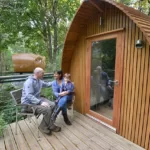I guess you are thinking of how to make your road trip eco-friendly and not cause any harm to the environment. You have done well and that decision itself is one of the first steps to achieving an eco-friendly road trip. Yes, if you are wondering, you can actually make your road trips as eco-friendly as possible by following certain processes and considering certain factors. If you don’t know what an eco-friendly trip is; it is a road trip that is all about prioritizing the environment by reducing your carbon footprint even while exploring new places and creating memories.
As we all know, sustaining the environment has even become more critical now than ever, and of course, road trips are no exception. Good thing is that this isn’t hard to achieve at all as there are several ways to make your road trip eco-friendly. Some of these processes include choosing an energy-efficient vehicle, carefully planning your road trip itineraries and routes to be eco-friendly, coming up with the most eco-friendly healthy road trip food ideas, and many other ways that would be discussed here.
Choose Vehicles and Transportation Modes That Are Environmentally Friendly
Planning a trip can be exciting and overwhelming at the same time. One important aspect to consider is how you want to get to your destination so you don’t only have the choose the best road trip itineraries but ones that are eco-friendly. When it comes to being environmentally friendly, there are several options to choose from.
Electric Vehicles (EVs)
These vehicles are powered by electricity and produce zero emissions, making them the most eco-friendly option for transportation. They are also very quiet and smooth to drive, so you can enjoy the scenery on your trip without the noise of a traditional gas engine.
Hybrid Vehicles
Hybrid vehicles have both an electric motor and a gasoline engine. They use the electric motor for low-speed driving and the gas engine for high-speed driving. The result is improved fuel efficiency and reduced emissions.
Fuel-Efficient Gasoline Vehicles
If an electric vehicle or hybrid vehicle is not an option for you, there are also fuel-efficient gasoline vehicles available. These vehicles have engines that are designed to use less fuel and emit fewer pollutants.
Carpooling
If you’re driving, consider carpooling with friends, family, or coworkers. This way, you can reduce the number of cars on the road and lower your carbon emissions.
Biking or Walking
If your destination is close by, why not walk or bike? Not only will you get some exercise, but you’ll also have a zero-emissions mode of transportation.
Plan Your Routes and Road Itineraries
Planning your routes and itineraries is possible with certain road trip apps and tools designed to make traveling by road come with easy. There are several things involved in planning your routes and they include the following.
Avoiding Congested Areas
When planning your route, try to avoid heavy traffic areas as much as possible. Not only will this help reduce your stress levels, but it’ll also lower your carbon emissions since your vehicle will be running more efficiently in lighter traffic.
Choosing the Shortest Route
Opt for the shortest route between your starting and ending points. This will help you reduce your fuel consumption and cut down on emissions.
Make an Environmental-Friendly Camping List and Technique
Of course, you should consider unique road trip accommodations like camping as they are not just eco-friendly but quite adventurous and less expensive. To achieve this, make sure to make a camping packing list including all the camping essentials you will be taking with you. Make sure that these options are eco-friendly. Here are some of the eco-friendly road trip essentials you should carry along.
Reusable Water Bottles
Instead of buying disposable plastic water bottles, bring a reusable water bottle on your trip. This will reduce waste and also save you money in the long run.
Cloth Bags
Bring reusable cloth bags with you on your trip to reduce the need for plastic bags. They can be used for groceries, souvenirs, or any other purchases you make on your trip.
Make Environmentally Conscious Food Choices
Going on an eco-friendly road trip? Don’t forget to pack some tasty snacks! Here are some tips for choosing snacks that are both delicious and environmentally friendly:
Bring Your Own Food
Instead of buying snacks at gas stations or fast food restaurants, bring your own food from home. Bringing your own food from home is a great way to reduce waste and avoid single-use packaging. You can pack sandwiches, salads, or leftovers, for example.
Choose Fresh Produce
Apples, bananas, and other fresh fruits are great options for a healthy, eco-friendly snack. They come in their own biodegradable packaging and can be easily packed for your trip.
Snack on Nuts and Seeds
Nuts and seeds are delicious and nutritious snacks that are easy to pack and store. Look for brands that use eco-friendly packaging and avoid those with excessive packaging.
Make Your Own Trail Mix
Mix together your favorite nuts, seeds, dried fruit, and other snacks for a tasty and eco-friendly treat.
Support Local and Organic Businesses
Look for local and organic restaurants and food stands to support sustainable and environmentally friendly food systems.
Choose Plant-Based Options
Plant-based foods like fruits, vegetables, legumes, and nuts have a lower carbon footprint compared to meat and dairy products. Consider incorporating more plant-based options into your diet during your road trip.
Reduce Food Waste
Plan your meals and snacks carefully to avoid over-purchasing and waste. If you do end up with leftovers, try to finish them or store them for later.
Reduce your Environmental Footprint During the Trip
Here are some tips to reduce your environmental footprint and for making your road trip more eco-friendly:
Fuel Efficiency
- Avoiding aggressive driving: Drive smoothly and avoid excessive acceleration, braking, and speed changes to conserve fuel and reduce emissions.
- Maintaining the recommended tire pressure: Keeping your tires at the recommended pressure can improve fuel efficiency and reduce emissions.
- Turning off the engine at rest stops: When you take a break, turn off your engine instead of idling. This can help conserve fuel and reduce emissions.
Minimizing Waste
- Recycling: Make an effort to recycle during your road trip by properly disposing of recyclable materials such as plastic bottles, paper, and cans.
- Composting: If possible, bring a small composting bin and compost food waste instead of throwing it away. This helps reduce waste and support soil health.
Choose Camping and Other Unique Accommodations
Going on an eco-friendly road trip and planning on camping or staying in accommodations? Here are some tips for making sustainable choices:
Choosing eco-friendly camping gear
Invest in high-quality gear that is made from sustainable materials and will last a long time. Also, look for gear with certifications like the Global Organic Textile Standard (GOTS) or the bluesign system.
Finding Sustainable Accommodations
Look for accommodations with eco-friendly certifications, such as the LEED or Green Key Certifications. Don’t forget to choose accommodations that use renewable energy sources, like wind or solar power.
Minimizing Environmental Impact while Camping
Use reusable plates, cups, and utensils instead of disposable ones. Also, use a camp stove or portable grill for cooking instead of starting a fire. And finally, don’t forget to dispose of waste properly and follow the “leave no trace” principle by not leaving any litter or damage to the natural environment.
Visiting New Communities on Your Eco-Friendly Road Trip
You can make an impact by visiting the communities you are lodging and by supporting sustainable initiatives in the places you visit! Here are some ways to get involved in community service to promote sustainability:
Choose Locally Owned and Operated Businesses
Supporting local businesses can help boost the local economy and reduce the carbon footprint associated with transportation.
Purchase Products Made from Sustainable Materials
Look for products made from recycled materials, organic cotton, or other sustainable materials.
Participate in Community Events and Initiatives
Get involved in local community events and initiatives that support sustainability, such as beach cleanups, farmers’ markets, or community gardens.
Reduce Water and Energy Usage
Conserve water and energy while staying in accommodations by taking short showers, turning off lights, and using energy-efficient appliances.
Conclusion
In conclusion, an eco-friendly road trip is not only possible, but it’s also a great way to reduce your impact on the environment while exploring new places. Sustainability should be a consideration in all aspects of our lives, including travel. By making conscious choices, we can reduce our impact on the environment and support sustainable initiatives. So next time you’re planning a road trip, consider these eco-friendly tips and continue to make environmentally conscious choices in all aspects of your life.



























